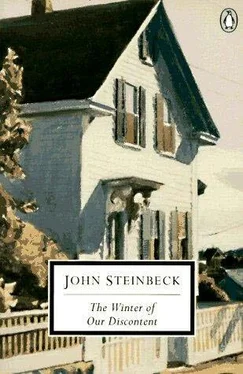John Steinbeck - The Winter of Our Discontent
Здесь есть возможность читать онлайн «John Steinbeck - The Winter of Our Discontent» весь текст электронной книги совершенно бесплатно (целиком полную версию без сокращений). В некоторых случаях можно слушать аудио, скачать через торрент в формате fb2 и присутствует краткое содержание. Жанр: Классическая проза, на английском языке. Описание произведения, (предисловие) а так же отзывы посетителей доступны на портале библиотеки ЛибКат.
- Название:The Winter of Our Discontent
- Автор:
- Жанр:
- Год:неизвестен
- ISBN:нет данных
- Рейтинг книги:5 / 5. Голосов: 1
-
Избранное:Добавить в избранное
- Отзывы:
-
Ваша оценка:
- 100
- 1
- 2
- 3
- 4
- 5
The Winter of Our Discontent: краткое содержание, описание и аннотация
Предлагаем к чтению аннотацию, описание, краткое содержание или предисловие (зависит от того, что написал сам автор книги «The Winter of Our Discontent»). Если вы не нашли необходимую информацию о книге — напишите в комментариях, мы постараемся отыскать её.
The Winter of Our Discontent — читать онлайн бесплатно полную книгу (весь текст) целиком
Ниже представлен текст книги, разбитый по страницам. Система сохранения места последней прочитанной страницы, позволяет с удобством читать онлайн бесплатно книгу «The Winter of Our Discontent», без необходимости каждый раз заново искать на чём Вы остановились. Поставьте закладку, и сможете в любой момент перейти на страницу, на которой закончили чтение.
Интервал:
Закладка:
“Will you be guided by me, sweetheart?”
“Well, of course—”
“In everything?”
“Are you being silly?”
“I’m dead serious—dead!”
“I believe you are. But you can’t go around doubting Mr. Baker. Why, he’s—he’s—”
“He’s Mr. Baker. We’ll listen to what he has to say and then—I still will want that money right in the bank where it is.”
Allen shot through the back door as though fired by a sling-shot. “Marullo,” he said. “Mr. Marullo’s outside. He wants to see you.”
“Now what?” Mary demanded.
“Well, ask him in.”
“I did. He wants to see you outside.”
“Ethan, what is it? You can’t go out in your robe. It’s Easter Sunday.”
“Allen,” I said, “you tell Mr. Marullo I’m not dressed. Tell him he can come back later. But if he’s in a hurry, he can come in the front door if he wants to see me alone.” He dashed.
“I don’t know what he wants. Maybe the store’s been robbed.”
Allen shot back. “He’s going around front.”
“Now, dear, don’t you let him spoil your breakfast, you hear me?”
I went through the house and opened the front door. Marullo was on the porch, dressed in his best for Easter mass, and his best was black broadcloth and big gold watch chain. He held his black hat in his hand and he smiled at me nervously like a dog out of bounds.
“Come in.”
“No,” he said. “I just got one word to say. I heard how that fella offered you a kickback.”
“Yes?”
“I heard how you threw him out.”
“Who told you?”
“I can’t tell.” He smiled again.
“Well, what about it? You trying to say I should have taken it?”
He stepped forward and shook my hand, pumped it up and down twice very formally. “You’re a good fella,” he said.
“Maybe he didn’t offer enough.”
“You kidding? You’re a good fella. That’s all. You’re a good fella.” He reached in his bulging side pocket and brought out a bag. “You take this.” He patted my shoulder and then in a welter of embarrassment turned and fled; his short legs pumped him away and his fat neck flamed where it bulged over his stiff white collar.
“What was it?”
I looked in the bag—colored candy Easter eggs. We had a big square glass jar of them at the store. “He brought a present for the kids,” I said.
“Marullo? Brought a present. I can’t believe it.”
“Well, he did.”
“Why? He never did anything like that.”
“I guess he just plain loves me.”
“Is there something I don’t know?”
“Duck blossom, there are eight million things none of us know.” The children were staring in from the open back door. I held out the bag to them. “A present from an admirer. Don’t get into them until after breakfast.”
As we were getting dressed for church, Mary said, “I wish I knew what that was all about.”
“Marullo? I’ll have to admit, darling, I wish I knew what it was all about too.”
“But a bag of cheap candy—”
“Do you suppose it might be a grave simplicity?”
“I don’t understand.”
“His wife is dead. He has neither chick nor child. He’s getting old. Maybe—well, maybe he’s lonely.”
“He never has been here before. While he’s lonesome, you should ask him for a raise. He doesn’t drop in on Mr. Baker. It makes me nervous.”
I gauded myself like the flowers of the field, decent dark suit, my burying black, shirt and collar so starchly white they threw the sun’s light back in the sun’s face, cerulean tie with cautious polka dots.
Was Mrs. Margie Young-Hunt whomping up ancestral storms? Where did Marullo get his information? It could only be Mr. Bugger to Mrs. Young-Hunt to Mr. Marullo. I do not trust thee Margie Young, the reason why I cannot tongue. But this I know and know right spung, I do not trust thee Mrs. Young. And with that singing in my head I delved in the garden for a white flower for my Easter buttonhole. In the angle made by the foundation and the sloping cellar door there is a protected place, the earth warmed by the furnace and exposed to every scrap of winter sunlight. There white violets grow, brought from the cemetery where they grow wild over the graves of my ancestors. I picked three tiny lion-faced blossoms for my buttonhole and gathered a round dozen for my darling, set their own pale leaves about them for a nosegay, and bound them tight with a bit of aluminum foil from the kitchen.
“Why, they’re lovely,” Mary said. “Wait till I get a pin, I’ll wear them.”
“They’re the first—the very first, my creamy fowl. I am your slave. Christ is risen. All’s right with the world.”
“Please don’t be silly about sacred things, dear.”
“What in the world have you done with your hair?”
“Do you like it?”
“I love it. Always wear it that way.”
“I wasn’t sure you’d like it. Margie said you’d never notice. Wait till I tell her you did.” She set a bowl of flowers on her head, the yearly vernal offering to Eostre. “Like it?”
“I love it.”
Now the young got their inspection, ears, nostrils, shoe-shines, every detail, and they resisted every moment of it. Allen’s hair was so plastered that he could hardly blink. The heels of his shoes were unpolished but with infinite care he had trained a line of hair to roll on his crested brow like a summer wave.
Ellen was girl of a girlness. All in sight was in order. I tried my luck again. “Ellen,” I said, “you’re doing something different with your hair. It becomes you. Mary, darling, don’t you like it?”
“Oh! She’s beginning to take pride,” Mary said.
We formed a procession down our path to Elm Street, then left to Porlock, where our church is, our old white-steepled church, stolen intact from Christopher Wren. [32] Christopher Wren: (1632-1723) Renowned English architect who designed St. Paul’s Cathedral in London, as well as many other churches and secular buildings.
And we were part of a growing stream, and every woman in passing had delight of other women’s hats.
“I have designed an Easter hat,” I said. “A simple, off-the-face crown of thorns in gold with real ruby droplets on the forehead.”
“Ethan!” said Mary sternly. “Suppose someone should hear you.”
“No, I guess it couldn’t be popular.”
“I think you’re horrid,” Mary said, and so did I, worse than horrid. But I did wonder how Mr. Baker would respond to comment on his hair.
Our family rivulet joined other streams and passed stately greetings and the stream was a river pouring into St. Thomas’s Episcopal Church, a medium-high church, maybe a little higher than center.
When the time comes that I must impart the mysteries of life to my son, which I have no doubt he knows, I must remember to inform him about hair. Armed with a kindly word for hair, he will go as far as his concupiscent little heart desires. I must warn him, however. He may kick, beat, drop, tousle, or bump them, but he must never—never—mess their hair. With this knowledge he can be king.
The Bakers were just ahead of us going up the steps, and we passed decorous greetings. “I believe we’re seeing you at tea.”
“Yes, indeed. A very happy Easter to you.”
“Can that be Allen? How he’s grown. And Mary Ellen. Well, I can’t keep track—they shoot up so.”
There’s something very dear about a church you grew in. I know every secret corner, secret odor of St. Thomas’s. In that font I was christened, at that rail confirmed, in that pew Hawleys have sat for God knows how long, and that is no figure of speech. I must have been deeply printed with the sacredness because I remember every desecration, and there were plenty of them. I think I can go to every place where my initials are scratched with a nail. When Danny Taylor and I punched the letters of a singularly dirty word with a pin in the Book of Common Prayer, Mr. Wheeler caught us and we were punished, but they had to go through all the prayerbooks and the hymnals to make sure there weren’t more.
Читать дальшеИнтервал:
Закладка:
Похожие книги на «The Winter of Our Discontent»
Представляем Вашему вниманию похожие книги на «The Winter of Our Discontent» списком для выбора. Мы отобрали схожую по названию и смыслу литературу в надежде предоставить читателям больше вариантов отыскать новые, интересные, ещё непрочитанные произведения.
Обсуждение, отзывы о книге «The Winter of Our Discontent» и просто собственные мнения читателей. Оставьте ваши комментарии, напишите, что Вы думаете о произведении, его смысле или главных героях. Укажите что конкретно понравилось, а что нет, и почему Вы так считаете.











